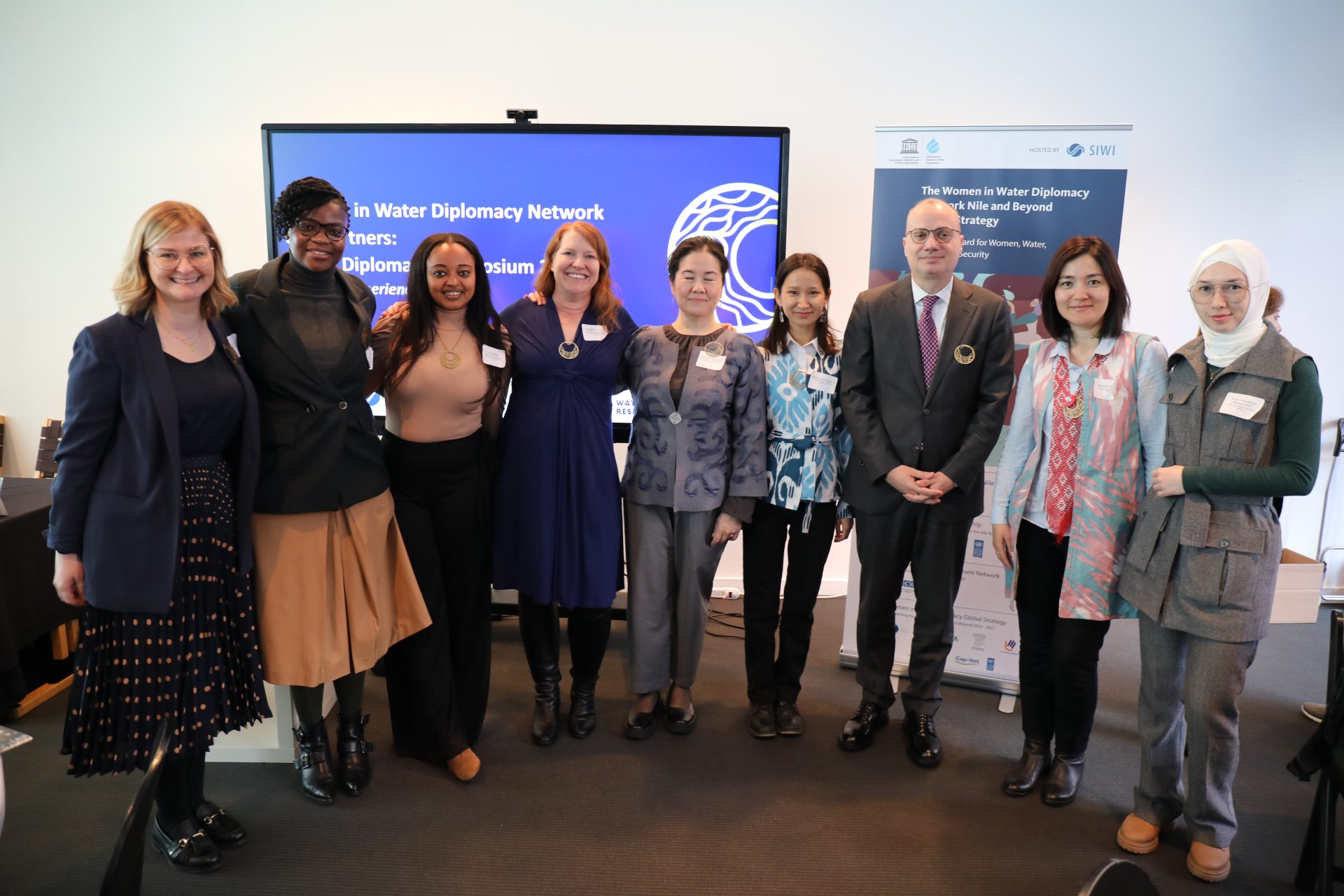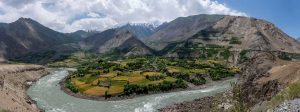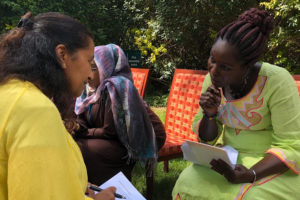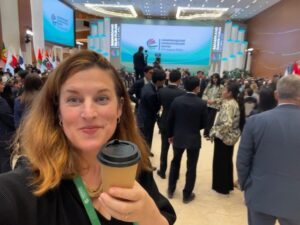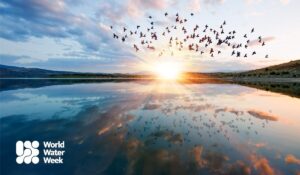Inclusion Perspectives on the UN Water Conference
It was with great pride and privilege that Shohida Tulieva, President of the Central Asia and Afghanistan’s Women in Water Association (CAAWWA) and member of the Women in Water Management Network in Central Asia and Afghanistan and Xanani Baloyi, Programme Officer and Gender Equality Focal Point at SIWI participated in all the engagements planned at and around the UN Water Conference to support the Women in Water Diplomacy Network.
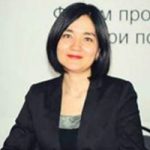
Both Shohida and Xanani are active members of the Global Women in Water Diplomacy Network and were, in various capacities, able to represent the Global South (Central Asia and Southern Africa respectively) through sharing knowledge and experience sharing and learning. Special focus was made on elevating the Women in Water Diplomacy Network’s Global Strategy – Strategic Pillar 4 – which aims to ‘contribute to elevating dialogue, knowledge, and experience around the intersecting themes of the Women in Water Diplomacy Network as part of basin-wide, regional, and global dialogue processes.’
On March 20, Xanani Baloyi spoke at the public event convened to align with alumni activities hosted by Columbia University and drew attention to the Network’s linkages between the water, peace and security agenda and the women, peace, and security agenda. She emphasized the important role of women in driving cooperation, as well as the fact that although water is a driver of conflict in many parts of the world, water cooperation also has potential to foster peace and security. In the same event, the chair, Justin Burke, Lecturer of International and Public Affairs at Harriman Institute at Columbia University facilitated an interactive conversation with the Network Members where Shohida joined the expert panelists sharing experiences from Tajikistan regarding women’s participation in transboundary water cooperation. Shohida spoke about the need to integrate factors such as culture and traditions when promoting gender equality in water resources management. This is especially important since there are various categories of women involved in water resources issues: women who show interest in being key actors but are not afforded the opportunity to do so; and mid-level to senior women who are at strategic positions and able to take decisions in water management.
On March 21, Shohida and Xanani were joined by many other stakeholders ranging from development partners, diplomats, water professionals, and government representatives at the Women in Water Diplomacy Network’s Water Diplomacy Symposium and experience exchange for global water decision makers and experts. The engagement was fruitful and resulted in many opportunities to build partnerships. The Symposium was also followed by a closed meeting of development partners including representatives from the governments of the United States of America, Sweden, Finland, UNDP, and the Netherlands.
On March 22, Xanani was incredibly honoured to represent SIWI and the Women in Water Diplomacy Network as speaker at the Water, Peace and Security in Africa session convened by Finland and the African Union convened in the UN’s ECOSOC chamber. Sitting on a panel chaired by Antti Rautavaara, Special Envoy for Water Centre for Peace Mediation, Ministry for Foreign Affairs of Finland, Xanani highlighted the Women in Water Diplomacy’s Global Strategy consultative process, noting that it had culminated into global strategy widely adopted and supported beyond the Nile Basin where the Network was initiated. The strategy presents mechanisms and activities to contribute to the Network’s objective of elevating women’s voices in the global agenda and transboundary water cooperation. Xanani particularly appreciated the cross-disciplinary collaboration between the Ministries of Foreign Affairs and the Water sector both of which increasingly recognize water’s peace and security linkages and the important role that women bring in driving cooperation.
About the Network
The Women in Water Diplomacy and Water Management promotes promotes women water professionals’ participation in decision-making in the water sector and gender mainstreaming in water governance, inthe Nile region and Central Asia and Afghanistan.
The Women in Water Diplomacy network in the NileWomen in Water Management in Central Asia and Afghanistan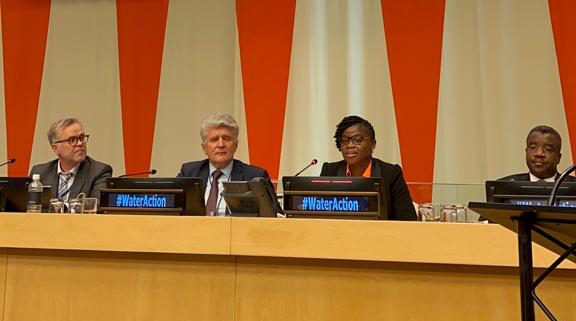
Shohida and Xanani also jointly participated in the side event co-convened by Tajikistan and the Basin Women’s Forums entitled ‘The Role and Perspectives of Women’s Participation in Integrated Water Resources Management in the Tajik Syrdarya and Kafarnigan River Basins and Nile Basin.’ They discussed the challenges that women face in accessing water resources and how women are working to address these challenges at the Basin level. They also spoke about the importance of women’s participation in decision-making processes related to water management and water use efficiency.
Shohida gained a lot of interesting and useful insights and appreciated the UN Water Conference as an invaluable networking platform fostering a more inclusive environment for water professionals and international organizations with interests in the water sector. Xanani welcomed the fact that actors and organisations across sectors were present at the conference: “the UN Water Conference organisers were able to bring together many stakeholders that we do not usually find in water dialogues such as the World Trade Organization and some private sectors institutions.”
Xanani was quite vocal on inclusivity and the missed opportunities for countries of the Global South, who were underrepresented at the event. Although she appreciated the fact that some countries and regional organisations such as Tajikistan, the Orange-Senqu River Basin Commission (ORASECOM), the Permanent Okavango River basin Water Commission (OKACOM) and Zambezi Watercourse Commission (ZAMCOM) and some others were able to participate physically in the conference and showcase their expertise, experience and strategies pertaining to inclusive and integrated water resources management, Xanani expressed concern regarding the challenging timeframe from the approval of sessions proposals to the start of the conference.
Looking ahead, Shohida committed to raising more awareness among students at the relevant universities in Sughd, Tajikistan, with the aim to motivate and inspire students to pursue university courses pertaining to managing water for sustainable development. Furthermore, she will help replicate the experience of the Basin Women Forum of the Syr Darya River to other basins in Tajikistan and contribute to the continued development of the Bottom-Up approach. Xanani thought her participation at the UN Water Conference was a deeply rewarding experience given that her career in transboundary water cooperation began in 2018, the year when the UN Water Action Decade was established. ‘With over 700 voluntary commitments made at the UNWC, thus bringing great perspective of water on the global agenda, the hope is that there will be accountability measures in place as I look forward to the rest of the implementation of commitments and reviews throughout the tenure of the Water Action Decade 2018 – 2028’, Xanani stated.
From the Network’s perspective, the general reflection is that the UN Water Conference is regarded as a strategic and prioritized milestone for collective Network engagements to tangibly impact the trajectory of water and peace-related discourse in the transboundary basins globally. We found a lot of value in the sessions we organized and participated in, and the networking platform afforded to our members.
More details on the various engagements can be found in the Women in Water Diplomacy Network After Action Report: The Water Diplomacy Symposium and Network Engagement in the 2023 UN Water Conference. Available in full here.
